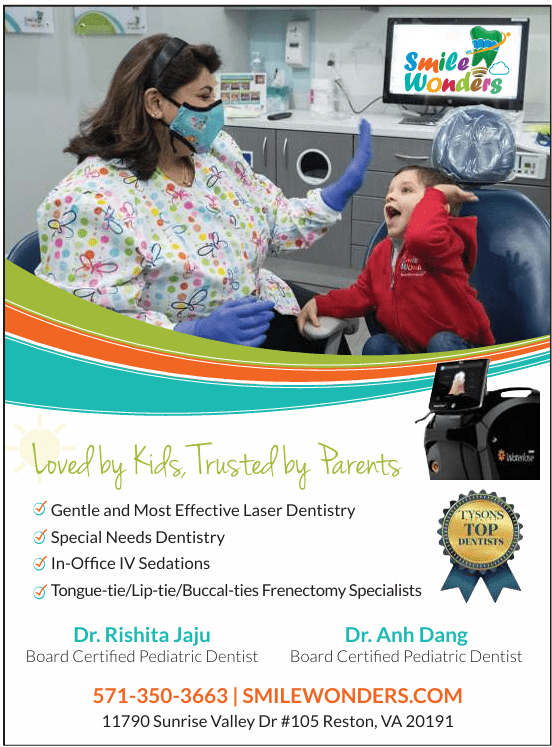What all parents need to know about oral health, children’s feeding concerns, and laser dentistry
By DR. RISHITA JAJU – Smile Wonders Pediatric Dentistry

How can I improve my baby or child’s feeding struggles!
Seeing our baby or child feed and grow comfortably and efficiently is a big part of enjoying parenthood.
Whether you are a new mom trying to breastfeed your baby, a parent looking to improve efficiency of bottle-feeding, or you have a child who’s having difficulties with certain table foods, there can be many challenges that get in the way of this simple but precious experience.
Here are the top 4 providers that can help a struggling baby or child feed better:
‘Mom-friendly’ Primary Care Provider (PCP): A mom-friendly PCP’s care philosophy gives equal importance to parenting (and feeding) preferences along with medical management of their patient. Simply put, they look beyond just growth charts and weight gain. They help minimize the efforts that parents and babies may have to put into keeping up with the child’s weight gain and growth. They can screen for anatomical concerns of lip/tongue tie but also understand the gravity of functional issues in their diagnosis and management. When they work closely with a savvy team of support providers, their patient families have the best experience of successful long-term outcomes.
Savvy Feeding Support Providers: Depending on age and needs, a Lactation Consultant or a Feeding/Occupational Therapist can provide valuable support to moms and babies. For newborns, an experienced lactation consultant empowers parents with information and education regarding the benefits of proper latch position, frequency, and quantity of feeds. For some babies and older kiddos that are having difficulty coordinating a proper swallow, an experienced feeding/occupational therapist can greatly assist with techniques to improve the strength and stamina of oral muscles, including the lips, tongue, cheeks, as well as soft palate. These providers are crucial for alleviating the impact of feeding difficulties on the overall mental health of parents. These experienced providers can greatly assist in establishing necessity, readiness, and proper timing for a procedure such as frenectomy to remove the lip/tongue-tie if they are restricting a baby’s ability to feed well.
Providers that establish healthy mouth-body connections: Sometimes feeding difficulties arise from muscle tension or neurological disorders. Bodywork therapists such as Infant Massage Specialists or Physical therapists who have knowledge and experience with cranio-sacral therapy (CST) can greatly help babies that have small opening of mouth, tightness in neck or shoulder muscles (torticollis) or head turning or side preference. They are able to address muscle tension in the neck/shoulder/floor of the mouth and palate anatomy for effective seal, suction and stamina. These providers can also recognize if there are any oral tethers (lip/tongue-tie) that are restricting the optimal mouth function of a baby/child. If there is a need for a procedure, they help provide the optimal relaxation of the body muscles and establish readiness for the frenectomy procedure.
Skilled Frenectomy Provider: For infants, toddlers, and children that have signs and symptoms of lip and/or tongue tie, it is important to find a provider who is master of their domain in performing thorough and complete release of the tethered oral tissues. A skillfully completed procedure is at the heart of short-term outcomes and long-term success for all patients. They are experts in oral motor function and assessment of all areas of the baby’s mouth—the lip, tongue, and buccal ties. Understanding the optimal function, growth, and development markers is key to successful diagnosis and treatment planning. Babies are a moving target, and the real estate for the procedure is extremely limited. While the provider’s skill and experience are the primary determinants of the safety of the care, the tools they use have an impact on the quality of the care and patient outcomes. A laser’s biologically protective method allows for desensitizing and gently removing the tissue rather than cutting it. This reduces the need for local or general anesthesia in the majority of cases. Experienced providers who have completed thousands of successful procedures and have kept up with training and knowledge of medical management as well as laser technology are able to do the procedure conservatively and safely. Experts also realize the importance of effective aftercare and rehabilitation exercises after the procedure so that the baby/child can maximize the impact of the newly obtained range of motion. They follow their patients for early markers of optimal healing and long-term improvement in function. These are some of the hallmark characteristics of expert frenectomy providers.
A Collaborative Team approach
When your team of professionals works with each other and shares your parenting philosophy, they can assist the baby and the parents with all aspects of feeding with medical, behavioral, or surgical methods when needed and can make the biggest difference! Feeding can become truly enjoyable and nutritious without unnecessary struggles.

Dr. Rishita Jaju is a board-certified pediatric laser dentist, and the team at Smile Wonders are recognized experts in the field of infant feeding difficulties and laser frenectomies. She completed her dental education at Harvard School of Dental Medicine in Boston, MA, and specialty training at the Children’s National Medical Center in Washington, DC. She is one of the few pediatric dentists in the country who is dual-qualified as a Master Status Laser Dentist from the Academy of Laser Dentistry and as a Breastfeeding Specialist. She works closely with some wonderful’mom-friendly’ pediatricians, excellent feeding support providers, and bodywork therapists that understand and improve the mouth-body connections in the DMV and would be happy to make the connections for your family!

